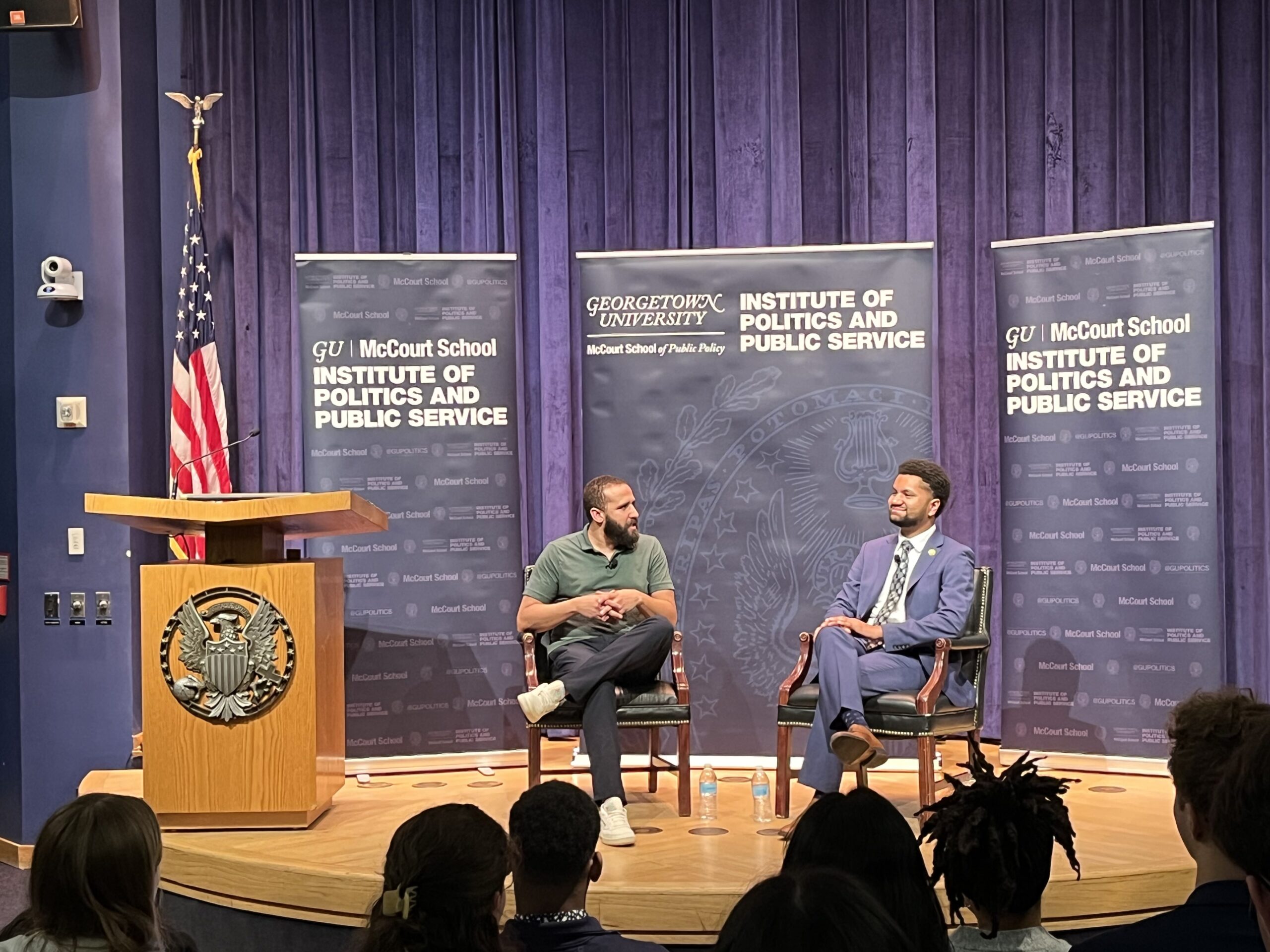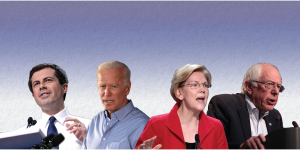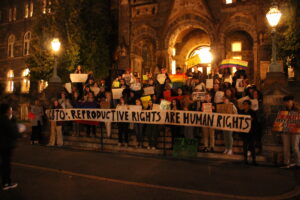From his work as an activist to making history as the first Generation Z member of Congress, Rep. Maxwell Frost’s career has been action-packed. On April 10, Frost, a Democrat, came to Georgetown for a conversation about his path to political office. The event, hosted by Georgetown’s Institute of Politics and Public Service, was titled “From Protest to Power: Is it Gen Z’s Turn to Lead?” and explored the role of identity, passion, and activism in politics.
Frost, 27, is the youngest member of the U.S. Congress, representing Florida’s 10th Congressional District. He was elected in 2022, after serving as an organizer and activist with the American Civil Liberties Union and March for Our Lives, an organization dedicated to gun control advocacy.
The conversation was moderated by GU Politics Spring ’22 Fellow and journalist Wesley Lowery, who has reported for the Washington Post and CBS News. Lowery led a team of journalists who won a Pulitzer Prize in 2016 for their coverage of fatal police shootings in the U.S.
Lowery began with the upcoming elections.
“How scared are you for November 2024?” he asked.
Frost emphasized that the upcoming elections are high-stakes for all Americans and his constituency in Florida, referencing two Florida ballot initiatives which would protect abortion rights and legalize recreational marijuana.
“We have some real challenges ahead of us, but we’re gonna win,” Frost said. “I’m confident because if we do what we need to do, if we do the work, I think we will take back the House of Representatives. I think we will reelect the president, or reject Donald Trump, for another term. And I think in the state of Florida, we will pass both of these ballot initiatives and show people that our state is worth fighting for.”
Lowery then asked how Frost approaches political apathy, especially when many Americans lacking trust in the political system are discouraged from voting.
“The problem that you see in a lot of politics is, there’s a lot of shaming. There’s a lot of demeaning people,” Frost said. “I have a very specific type of organizing. It’s based on a lot of love, and it’s based on a lot of grace. I will not shame apathy, but I’ll inspire action.”
Frost acknowledged that frustration with the political system often arises due to lived experiences with political institutions. Lowery also asked how Frost balances his identity as an activist turned elected official.
“I realized I was running to go into an institution that has caused a lot of harm to people like myself and to people across the country, and people really around the world. But I also recognize that we need people we trust in these positions,” Frost said. “I trust myself to advocate on the issues that I care about and that my constituents care about.”
Frost’s passion for these issues and progressive activism inspired him to run for office. While he’s now well-known for being the first Gen Z member of Congress, achieving that title was never the motivation behind Frost’s campaign, and his team never made his age a significant part of marketing or commercials, he said.
Yet, Frost worries that some young people now might enter politics or advocacy for recognition rather than passion for a cause.
“My fear is I’ve met a lot of people in this work that are my age that I felt like are getting into it because they are very ambitious people, but not because they’re passionate about the specific issue,” Frost said.
While his age wasn’t his reason for running, Frost said that it’s still a relevant part of his identity and work in Congress.
“That’s important and I want to be clear, I feel incredibly honored to have been able to do that,” Frost said, in reference to being the youngest member of Congress. “I’m also the first Afro-Cuban in Congress, no one talks about that. So all these things are important, all the parts of my identity are important to me.”
Frost went on to discuss the challenges of running for office. He shared his own experience being houseless for two months during his campaign, and driving for Uber after long days of campaigning so that he could pay his bills.
“I was able to slum it out for a year and a half. But, this is why working families aren’t represented in Congress,” he said. “If I had kids, I would have dropped out a few months into my election.”
Frost critiqued how the difficulty of running for office makes holding political office inaccessible.
“Running for office should not be easy, but it shouldn’t be damn near impossible,” he said.
To close, Lowery asked what advice Frost would give to students hoping to pursue careers in politics, advocacy, and public service.
“There are certainly people, young people, in the audience who have both passion and aspiration to maybe one day be sitting on this chair where you are and wear that pin or to be a leading figure on some of these fights they really care about,” Lowery said. “What would you say to them?”
Frost emphasized the importance of an array of political strategies, encouraging students to respect those who choose to advocate in different ways.
“I’ve been in spaces where people go, ‘Voting doesn’t matter, it doesn’t do anything.’ I’ve been in voting spaces, people say, ‘Marching doesn’t do anything, why would you do that?’” Frost said. “I know for a fact that we have to use every tool in our toolbox. So whatever you choose to do, be proud of it and know that it is important to the greater timeline of justice for our people and the world that we want.”




